新目标九年级U6-14讲义(无答案)
人教新目标九年级英语unit6单元讲义
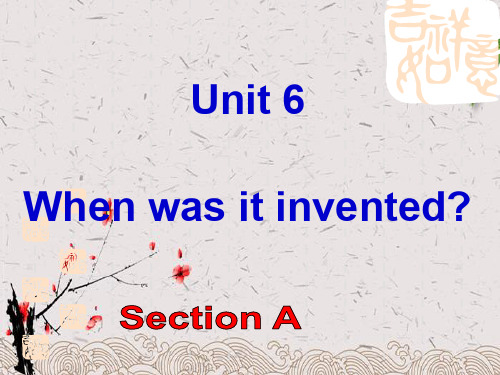
2b Listen again and complete the chart.
Invention
shoes with special heels
What is it / are they used for?
_ch__a_n_g_in_g_ the style of the shoes
shoes with lights seeing _in__t_h_e_d_a_r_k__
一、按要求写出下列词汇或词组
1. ruler (动词) __r_u_le_______ 2. near (副词) ___n_e_a_r_ly________ 3. nation (形容词) ___n_a_ti_o_n_a_l_____ 4. 偶然;意外地 __b_y__a_c_ci_d_e_n_t___
Active Voice: Alexandar Graham Bell invented the telephone in 1876. Passive Voice: The telephone was invented (by Alexander Graham Bell) in 1876.
根据课本内容,完成下列句子。 1. 拉链是什么时候被发明的?
Paragraph 3
How tea was invented by accident
3b Read the passage again and answer the questions.
1. When was tea first drunk? Nearly 5,000 years ago.
2. How was tea invented?
_d__ 1876 _a__ 1885 _c__ 1927 _b__ 1971
人教版新目标九年级英语Unit6单元教案复习课程

人教版新目标九年级英语Unit6单元教案第 6 单元教材分析一、单元教材分析本节课的主要话题是谈论历史上的发明物。
二、单元总体目标:1.知识和技能目标:1)谈论历史上的发明物2) 掌握本课单词和短语be made of /be made in;了解一般过去时态被动语态的结构和用法。
2.过程与方法目标:1)能运用所学知识练习被动语态的句式。
2)能用所学句型进行交际练习。
3.情感、态度和价值观目标:培养学生的听说演等能力及合作学习的意识。
三、单元重点:教学重点: 熟练掌握be made of ; be made in 的运用。
四、教学难点:被动语态的运用及构成。
五、单元教学方法:采用Concluding, Role playing 和Comparing 的学习策略,来展开课堂pairwork问大师的口语交际活动和讨论活动来谈论名人所采用的学习方法。
词汇教学:情景操练,反复使用。
口语教学;师生互动,生生互动,对话练习,交际活动。
阅读教学:利用词典等工具书,根据上下文查寻词义。
语法教学:总结规律,模仿操练。
六、单元课时分配:6课时Period 1 Section A (1a-1c)Period 2 Section A (2a-2d)Period 3 Section A (3a-3c) Period 4 Section A (Grammar Focus-4c)Period 5 Section B (1a-2e) Period 6 Section B (3a-Self Check)课题Unit 6 When was it invented?课时6课时教学课时第 1 课时总备课数第课时主备人郑海虹其他成员孙仲奎包组领导姜胜基教学目标KnowledgeObject:Talk about the history of inventionsIt was invented in 1876. What was it used for?It wasused to talk to people in other towns.Master: be + ppAbilityObject. :1)能运用所学知识练习被动语态的句式。
新版新目标英语九年级unit14知识点总结

Unit14IremembermeetingallofyouinGrade7.SectionA1.rememberdoing得做某事remembertodo着要做某事2.withone ’shelp=withsb=with’st he lphelpofsb在某人的帮助下helponeselftosth随.便吃⋯⋯helpsb.withsth. helpsb.(to)dosth.can’thelpdoingsth情.不自禁做某事忍不住做某事helpsbout帮助某人解决3.advisesb〔.not〕todosth.建某人〔不要〕做某事advisedoingsth建.做某事advise关于...某人建advisethat从句(should+do)4.instruction 指示,命令followtheinstructio nsforinstructionsonhowtodosth如何做某事的指示instructionstodosth做某事的指示onsb’sinstructions 遵守...的指示遵照某人的指示5.bepatientwith ⋯⋯有耐心6.workout解决,算出,果bepatientofsth忍耐某事workoutfine/well 奏效8.9.7.guidesb.todosth指.某人做某事 guidesb.tosp指引某人去某地10.encouragesb.todosth鼓.励某人做某事encouragesb.insth.在某方面鼓励某人/助某人的某种行11.preparefor...做准preparetodosth准做某事10.makeamess弄得一糟beinamess乱七八糟境狼getsbintoamess使某人陷入狼的境messup搞乱弄getintoamess陷入困境,遇到麻wishtodosth.希望做某事wishsb.todosth.希望某人做某事wish+that从句〔表示以的愿望〕hopetodosth希.望做某事hope+that从句〔表示可以的“希望〞或能到达的“期望〞〕12.It’stimetodosth到了.做某事的了。
人教新目标九年级英语全册Unit 14第六课时课件

A.clearly
B.carefully
C.carelessly D.properly
23.(2014年临沂)Three bridges ____over the river five years ago.
A.built B.build C.were built D.are built
24 . — Tell me one thing you're proud of in your junior high school, Tony.
感谢聆听
— I ___as captain of the school football team.
A.choose B.chose
C.am chosen D.was chosen
25.The terrorists (恐怖分子) in Xinjiang _______ last month.
A.are caught B.was caught
3.There are lots of choices a __ of you. You must decide by yourself.
4.Please s
__ the white shirt from the colored ones.
5.If you want to get more information about the company, please wait for the
C.were caught D.is caught
第六课时 Section B(3a-Self Check)
六、按要求完成句子,每空一词。(5×4分=20分)
26.She said, “I like swimming.” (改为间接引语)
人教版新目标九年级英语unit14教案(含习题)
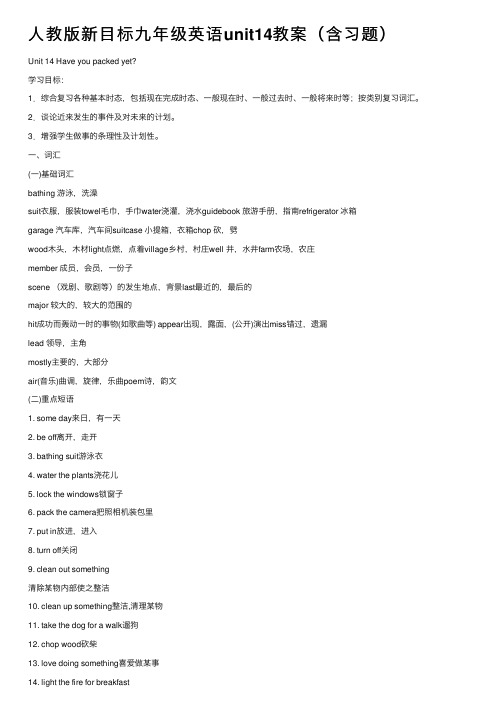
⼈教版新⽬标九年级英语unit14教案(含习题)Unit 14 Have you packed yet?学习⽬标:1.综合复习各种基本时态,包括现在完成时态、⼀般现在时、⼀般过去时、⼀般将来时等;按类别复习词汇。
2.谈论近来发⽣的事件及对未来的计划。
3.增强学⽣做事的条理性及计划性。
⼀、词汇(⼀)基础词汇bathing 游泳,洗澡suit⾐服,服装towel⽑⼱,⼿⼱water浇灌,浇⽔guidebook 旅游⼿册,指南refrigerator 冰箱garage 汽车库,汽车间suitcase ⼩提箱,⾐箱chop 砍,劈wood⽊头,⽊材light点燃,点着village乡村,村庄well 井,⽔井farm农场,农庄member 成员,会员,⼀份⼦scene (戏剧、歌剧等)的发⽣地点,背景last最近的,最后的major 较⼤的,较⼤的范围的hit成功⽽轰动⼀时的事物(如歌曲等) appear出现,露⾯,(公开)演出miss错过,遗漏lead 领导,主⾓mostly主要的,⼤部分air(⾳乐)曲调,旋律,乐曲poem诗,韵⽂(⼆)重点短语1. some day来⽇,有⼀天2. be off离开,⾛开3. bathing suit游泳⾐4. water the plants浇花⼉5. lock the windows锁窗⼦6. pack the camera把照相机装包⾥7. put in放进,进⼊8. turn off关闭9. clean out something清除某物内部使之整洁10. clean up something整洁,清理某物11. take the dog for a walk遛狗12. chop wood砍柴13. love doing something喜爱做某事14. light the fire for breakfast点⽕做早饭15. collect water 挑⽔16. write original songs写原创歌曲17. make a music video制作⾳乐录影带18. a hit CD⼀张流⾏的CD19. go on a world tour进⾏世界巡20. in search of寻找,寻求21. hope to do something 希望做某事22. so far迄今为⽌23. be sure (not) to do⼀定(不)要做某事24. spend time (in) doing花费时间做…25. think of 想到,考虑26. turning point转折点27. in one?s life在某⼈的⼀⽣28. be off to离开去(某地)29. air show⾳乐表演⼆、⽇常⽤语1.Have you watered the plants? No,I haven’t.你已经浇花了吗?不,我没有。
九年级英语新目标 Unit 6 全单元课件
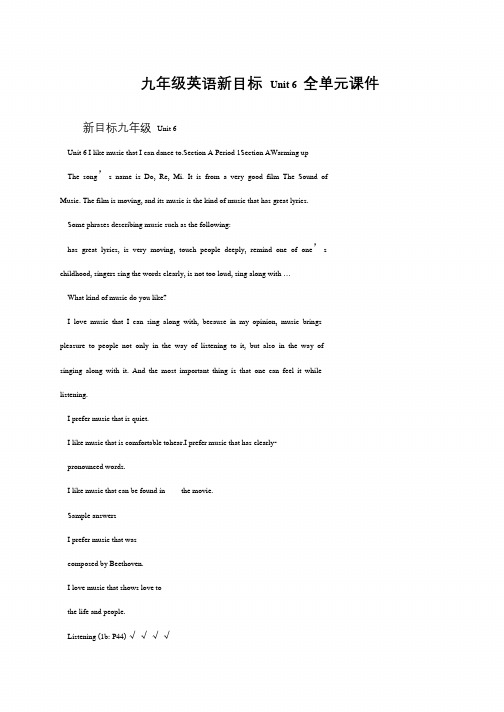
九年级英语新目标Unit 6 全单元课件新目标九年级Unit 6Unit 6 I like music that I can dance to.Section A Period 1Section AWarming up The song’s name is Do, Re, Mi. It is from a very good film The Sound of Music. The film is moving, and its music is the kind of music that has great lyrics. Some phrases describing music such as the following:has great lyrics, is very moving, touch people deeply, remind one of one’s childhood, singers sing the words clearly, is not too loud, sing along with …What kind of music do you like?I love music that I can sing along with, because in my opinion, music brings pleasure to people not only in the way of listening to it, but also in the way of singing along with it. And the most important thing is that one can feel it while listening.I prefer music that is quiet.I like music that is comfortable tohear.I prefer music that has clearly- pronounced words.I like music that can be found in the movie.Sample answersI prefer music that wascomposed by Beethoven.I love music that shows love tothe life and people.Listening (1b: P44)√√√√。
人教新目标英语初三unit6 讲义及练习
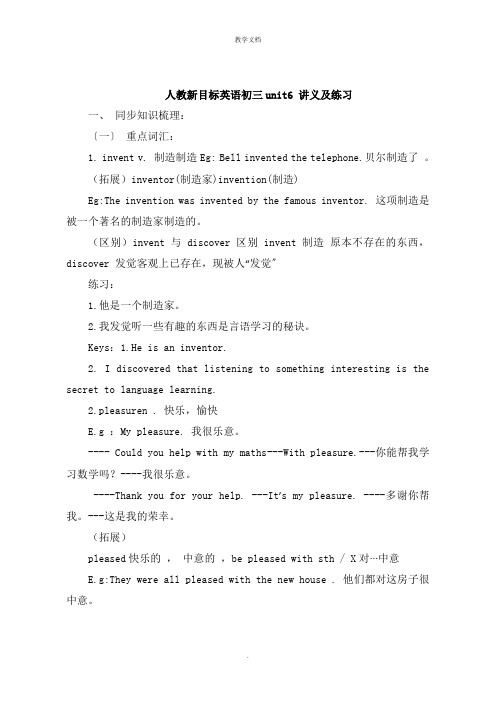
人教新目标英语初三unit6 讲义及练习一、同步知识梳理:〔一〕重点词汇:1. invent v. 制造制造Eg: Bell invented the telephone.贝尔制造了。
(拓展)inventor(制造家)invention(制造)Eg:The invention was invented by the famous inventor. 这项制造是被一个著名的制造家制造的。
(区别)invent 与discover区别invent 制造原本不存在的东西,discover 发觉客观上已存在,现被人“发觉〞练习:1.他是一个制造家。
2.我发觉听一些有趣的东西是言语学习的秘诀。
Keys:1.He is an inventor.2. I discovered that listening to something interesting is the secret to language learning.2.pleasuren . 快乐,愉快E.g :My pleasure. 我很乐意。
---- Could you help with my maths---With pleasure.---你能帮我学习数学吗?----我很乐意。
----Thank you for your help. ---It’s my pleasure. ----多谢你帮我。
---这是我的荣幸。
(拓展)pleased快乐的,中意的,be pleased with sth / X对···中意E.g:They were all pleased with the new house . 他们都对这房子很中意。
pleasant令人愉快的、讨人喜欢的(修饰物)Eg:I had a pleasant time.我玩的很开心。
练习:用pleasure,pleased,和pleasant 填空。
1.The two friends were very ________ to see each other again.2.He was looking very ________ with himself so I knew he had passed the exam.3.We had a _________ time.4.could you help me with my English?WithKeys:1.pleased 2.pleased 3.pleasant 4.pleasure2.listv.列表,列清单;n. 名单,清单Eg:The pionners of different inventons were listed there,在那儿不同制造的先驱们都被列了名单。
九年级Unit6讲义
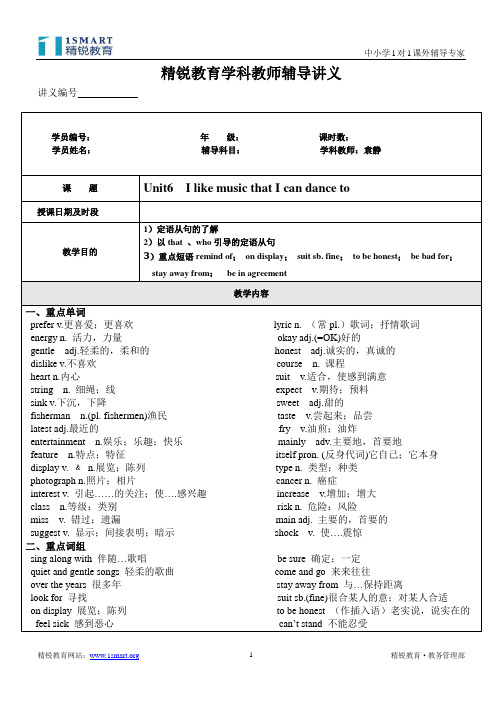
四、语法 1.What kind of music do you like? 2. I like music that I can sing along with. 3.Rosa likes music that’s quiet and gentle. 4. I love singers who write their own music. 5. We prefer music that has great lyrics. 语言点解析 五、语言点解析
精锐教育·教务管理部
中小学 1 对 1 课外辅导专家
be bad for 对….有ind of 提醒;使记起 三、重点句子
get together 相聚 be in agreement 意见一致
1.I prefer music that has great lyrics.(P44) 我更喜欢带有好歌词的音乐。 2.I like music that I can dance to.(P44) 我喜欢能随之跳舞的音乐。 3.The music reminds me of Brazilian dance music.(P46)这音乐使我回忆起巴西的舞曲。 4.It does have a few good features,though.(P48) 可是,它的确有一些好的特色。 5.Whatever you do,don’t miss this exhibition.(P48) 不管咋样,别错过了展览。 6.What do you think of it? (P46) 你认为它怎么样? 7.Be sure to see this exhibition at the Lido Galery.(P48)一定要去看看在利多举办的画展。 8.They don’t interest me as much.(P48) 它们同样唤不起我的兴趣。 9.There are many great photos of people and of the countryside.(P48) 有许多人物和乡村的巨幅照片。
新版新目标英语九年级unit6知识点总结(K12教育文档)

新版新目标英语九年级unit6知识点总结(word版可编辑修改)编辑整理:尊敬的读者朋友们:这里是精品文档编辑中心,本文档内容是由我和我的同事精心编辑整理后发布的,发布之前我们对文中内容进行仔细校对,但是难免会有疏漏的地方,但是任然希望(新版新目标英语九年级unit6知识点总结(word版可编辑修改))的内容能够给您的工作和学习带来便利。
同时也真诚的希望收到您的建议和反馈,这将是我们进步的源泉,前进的动力。
本文可编辑可修改,如果觉得对您有帮助请收藏以便随时查阅,最后祝您生活愉快业绩进步,以下为新版新目标英语九年级unit6知识点总结(word版可编辑修改)的全部内容。
Unit6 When was it invented?Section A1.invent v. 发明 inventor n. 发明家 invention n. 发明可数名词Edison, a greater inventor, invented many great inventions during his lifetime.2。
be used for doing用来做…(是被动语态)Pens are used for writing. 笔是用来写的。
Pens aren’t used for eating. 笔不是用来吃的。
3. style 样式,款式 the style of。
.. 的样式/风格be in style=be in season/fashion 时髦,流行 be out of style=be out of season/fashion 过时,不流行That’s not my style.那不是我的风格。
4.pleasure n. 愉快,高兴my pleasure 我很荣幸;别客气;非常高兴为您服务=It’s my pleasure. with plessure 为你效劳,是我的荣幸,乐意效劳用于别人请求你帮忙,表示愿意帮某人做某事My pleasure 或者是It's my pleasure。
Unit6讲义人教版九年级英语全册
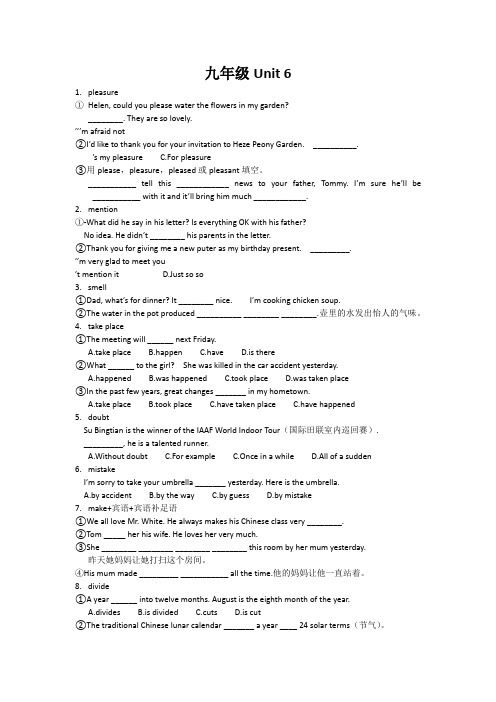
九年级Unit 61.pleasure①Helen, could you please water the flowers in my garden?________. They are so lovely.’’’m afraid not②I’d like to thank you for your invitation to Heze Peony Garden. __________.’s my pleasure C.For pleasure③用please,pleasure,pleased或pleasant填空。
___________ tell this ____________ news to your father, Tommy. I’m sure he’ll be ___________ with it and it’ll bring him much ____________.2.mention①-What did he say in his letter? Is everything OK with his father?No idea. He didn’t ________ his parents in the letter.②Thank you for giving me a new puter as my birthday present. _________.’’m very glad to meet you’t mention it D.Just so so3.smell①Dad, what’s for dinner? It ________ nice. I’m cooking chicken soup.②The water in the pot produced __________ ________ ________.壶里的水发出怡人的气味。
4.take place①The meeting will ______ next Friday.A.take placeB.happenC.haveD.is there②What ______ to the girl? She was killed in the car accident yesterday.A.happenedB.was happenedC.took placeD.was taken place③In the past few years, great changes _______ in my hometown.A.take placeB.took placeC.have taken place C.have happened5.doubtSu Bingtian is the winner of the IAAF World Indoor Tour(国际田联室内巡回赛)._________, he is a talented runner.A.Without doubt C.For example C.Once in a while D.All of a sudden6.mistakeI’m sorry to take your umbrella _______ yesterday. Here is the umbrella.A.by accidentB.by the wayC.by guessD.by mistake7.make+宾语+宾语补足语①We all love Mr. White. He always makes his Chinese class very ________.②Tom _____ her his wife. He loves her very much.③She ________ ________ ________ ________ this room by her mum yesterday.昨天她妈妈让她打扫这个房间。
新目标九年级第14单元课件2

本文主要分为三个部分,第一部分介绍了作者对旅行的 态度和经历,第二部分描述了一次难忘的旅行经历,第 三部分总结了旅行的意义和价值。
• 第一部分从文章开头到第2段,作者表达了自己对旅 行的热爱和多次旅行的经历,为下文做铺垫。
• 第三部分从第11段到结尾,总结了旅行的意义和价 值,强调旅行可以让人开阔眼界、增长见识。
语法练习
语法巩固
VS
通过语法练习,学生可以巩固所学的 语法知识,加深记忆和理解。
阅读理解
阅读技巧提升
通过阅读理解练习,学生可以提高阅读技巧 ,如快速阅读、寻找细节、理解主旨等。
阅读理解
阅读速度提高
通过大量的阅读理解练习,学生可以提高阅读速度, 缩短阅读时间,增加阅读量。
阅读理解
阅读理解能力增强
学习了如何描述旅行计划
通过本单元的学习,学生学会了如何用英语描述自己的旅行计划,包 括目的地、旅行时间、旅行方式等。
了解不同国家的文化和风俗习惯
本单元介绍了一些不同国家的文化和风俗习惯,帮助学生更好地了解 世界各地的文化差异。
提高了听力和口语能力
通过听力练习和口语活动,学生提高了自己的听力和口语能力,能够 更流利地与外国人交流。
下一步学习计划
学习第15单元
进行听说读写训练
继续学习新目标九年级英语教材的第 15单元,掌握更多的英语知识和技能。
通过多种形式的练习,提高自己的英 语应用能力。
加强词汇和语法学习
重点掌握第15单元中的词汇和语法知 识,打好英语基础。
THANKS FOR WATCHING
感谢您的观看
句子解析和翻译
深入理解 本文中有些句子表达深刻、语言优美,需要进行深入的解析和翻译。
人教版九年级英语讲义 Unit 14与练习 无答案2
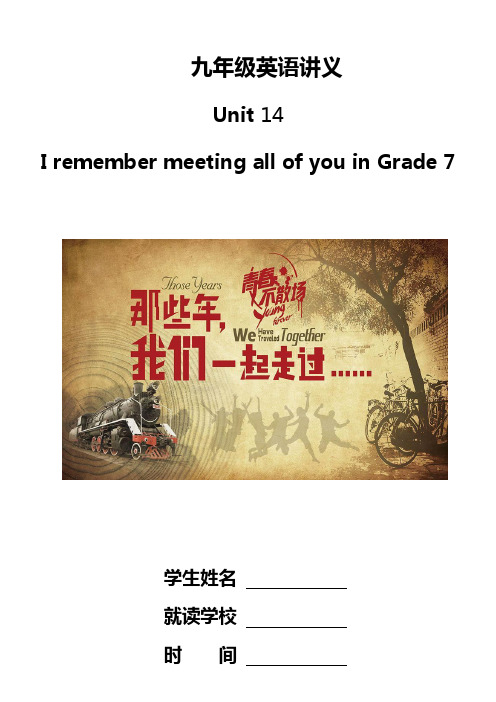
九年级英语讲义Unit 14I remember meeting all of you in Grade 7学生姓名就读学校时间本章的知识清单知识框架表短语集萃1.believe in 信任;信赖2.first of all 首先3.ahead of 在… 前面4.set out 出发;启程5.in a row 连续几次地6.work out 算出7.deal with 处理8.make a mess 弄得一团糟9.keep one’s cool 沉住气;保持冷静10.senior high ( school ) 高中11.be thirsty for 渴望;渴求12.be responsible for 对… 有责任、负责任13.separate from 分离;隔开14.look back at 回首(往事);回忆15.go by (时间)逝去;过去16.be thankful to sb. 对某人心存感激17.along with 连同;除… 以外还18.none of… 没有一个…19.be patient with 对… 有耐心20.make one’s own choice(s) 做出自己的选择21. prepare for 为… 作准备语法全解一、特殊疑问句的用法1. 概念:用疑问代词或疑问副词引导的疑问句叫特殊疑问句。
朗读时通常用降调。
常见的疑问代词有:who, whom, whose, which, what; 疑问副词有when, where, why, how。
特殊疑问句不能用yes或no回答。
(疑问代词简记为:8个w, 1个h)2. 结构:疑问句+一般疑问句3. 注意:疑问代词位于句首用作主语或用作修饰主语的定语时,特殊疑问句用陈述语序。
4. 巧记:(1)陈述句转换为特殊疑问句的方法:“W”扛旗走前面,后面跟的是一般;be词一定要提前,情态动词也赶先;实义动词请不动,do ( does )和did加在前;did,does加在前,“-ed”(-s, -es)看不见。
新目标九年级全册教案-6
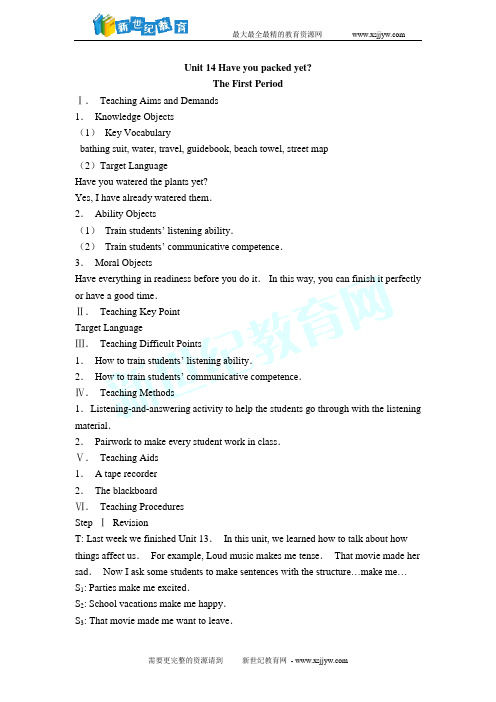
Unit 14 Have you packed yet?The First PeriodⅠ.Teaching Aims and Demands1.Knowledge Objects(1)Key Vocabularybathing suit, water, travel, guidebook, beach towel, street map(2)Target LanguageHave you watered the plants yet?Yes, I have already watered them.2.Ability Objects(1)Train students’ listening ability.(2)Train students’ communicative competence.3.Moral ObjectsHave everything in readiness before you do it.In this way, you can finish it perfectly or have a good time.Ⅱ.Teaching Key PointTarget LanguageⅢ.Teaching Difficult Points1.How to train students’ listening ability.2.How to train students’ communicative competence.Ⅳ.Teaching Methods1.Listening-and-answering activity to help the students go through with the listening material.2.Pairwork to make every student work in class.Ⅴ.Teaching Aids1.A tape recorder2.The blackboardⅥ.Teaching ProceduresStep ⅠRevisionT: Last week we finished Unit 13.In this unit, we learned how to talk about how things affect us.For example, Loud music makes me tense.That movie made her sad.Now I ask some students to make sentences with the structure…make me…S1: Parties make me excited.S2: School vacations make me happy.S3: That movie made me want to leave.S4: The story made me cry.S5: The awful picture makes me nervous.T: Very good.From today on, we will learn Unit 14.Now.I ask a student to come to the blackboard and write the numbers 1 to 20 on the blackboard.(After the student has written the numbers 1 through 5, start talking to the rest of the class)T: Has he written the number 1 yet?Class repeat the question.Has he written the number 1 yet?S s: Has he written the number 1 yet?T: (Pointing to the number 1 on the board)Yes, he has already written the number 1.Class repeat.Yes, he has already written the number 1.S s: Yes, he has already written the number 1.T: (Writing the word already on the blackboard)This is the word already.Class repeat.Already.Look at the blackboard.(pointing to the blackboard)Has he written the number 50 yet? Class repeat the question.Has he written the number 50 yet?S s: Has he written the number 50 yet?T: (Pointing to the highest number already on the blackboard)No, he hasn’t written the number 50 yet.Class repeat.No, he hasn’t wr itten the number 50 yet.S s: No, he hasn’t written the number 50 yet.T: (Writing the word yet on the blackboard)Tish is the word yet.Class repeat.Yet.Now, look at the two words already and yet.Which one is used to talk about things that have happened in the past?SSs: Already.T: Yeah.Very good.So the other word yet is used to talk about things that will happen in the future.Yeah?SS: Yes.Step Ⅱ1aThis activity introduces key vocabulary and helps students review vocabulary they already know.Read the instructions aloud to the class.Say, Who can give an example of a beach vacation and sightseeing in a city? Ask a student to give the example.(bathing suit, travel guidebook)Get students to add some things to the lists under the two headings.A beach vacation and Sightseeing in a city.Have students do the work individually first.While they are working, walk around the classroom checking the progress of the students.Let students tell the class the words they wrote.Write the words on the blackboard.Read them and let students repeat.Then ask other students to add other words to the lists.Sample answersA beach vacation 1.bathing suit 2.beach towel 3.sunglasses Sightseeing in a city travel guidebook street map cameraStep Ⅲ1bThis activity gives students practice in understanding the target language in spoken conversation.Look at the picture.Ask, What can you see in the picture? (There is a family in the picture.They are getting ready for a beach vacation)Point to the box.Invite a pair of students to read the conversation to the class.A: Have you packed the beach towels yet?B: No, I haven’t.Look at the six chores on the list.Let students read each item, then ask different students to explain the meaning of each item in their own words.Make sure students understand the meaning of each item.Go through the instructions with the class.Point to the blank lines in front of each item in the list.Say, You will hear a family talking as they get ready to go on vacation.Listen carefully.Make sure what the family talks about and put a checkmark in front of each chore that is already done.Play the tape.The first time students only listen.Play the tape a second time.Now listen to the tape again.This time please put your checkmarks on the correct blanks.Check the answers with the whole class.Answers√ packed the camera√ watered the plantslocked the windows√ bought a travel guidebookbought a street mappacked the beach towelsTapescriptWoman: Have you packed the beach towels yet?Boy: No, I haven’t.Can’t Judy pack them?Woman: No, she’s busy.Could you please water the plants?Boy:I’ve already watered them.Woman: Oh, thanks.Man: What about the travel guidebook and the street map?Woman: I’ve already bought the travel guidebook, but I haven’t got the street map yet.Man: That’s OK.I’ll get it.Have you packed the camera?Boy: Yes.I’ve already put it in my suitcase.Woman: Well, I guess that’s everything.Boy: Almost everything.We haven’t locked the windows yet.Step Ⅳ1cThis activity provides guided oral practice using the target language.Go through the instructions with the whole class.Look at the example in the box.Invite a pair of students to read it to the class.S A: Have you watered the plants yet?S B: Yes, I have already watered them.Tell students they will be making conversations with a partner.Look back at the chores in Activity lb.Say, Now look back at the chores in Activity lb.Make conversations talking about what the family members have already done and what they haven’t done yet, using words from the chores, such as packed the camera, locked the windows, bought a street map.While students are working in pairs, walk around the classroom and listen to some pairs.If necessary, offer language support.Then get several pairs of students to say their conversations to the class.Conversation 1S A: Have they packed the camera yet?S B: Yes, they have already packed the camera.Conversation 2S A: Have they bought a street map yet?S B: No, they haven’t bought a stree t map yet.Notes1.pack—(here)get ready for a journey by doing this2.guidebook—book for travellers, tourists, etc, with information about a place 3.Have you watered the plants yet?Yes, I have already watered them: PresentPerfect Tense.The structure is have+ p.p.Pay attention to the two words already and yet.Already is used in affirmative sentences; while yet is used in negative and interrogative sentences.Step ⅤSummaryIn this class, we’ve learned some important words, such as water, travel, gui debook, beach towel.We’ve also learned the target language.Have you watered the plants yet? Yes, I have already watered them.Step ⅥHomeworkMake conversations in pairs to review the target language.Step ⅦBlackboard DesignThe Second PeriodⅠ.Teaching Aims and Demands1.Knowledge Objects(1)Key Vocabularyrefrigerator, garage, suitcase, clean out, put in, turn off(2)Target LanguageHave you watered the plants yet?No, I haven’t.Have you packed the camera yet?Yes.I’ve already put it in my suitcase.Have you fed the cat?No.I haven’t fed her yet.2.Ability Object(1)Train students’ listening ability.(2)Train students’ speaking ability.3.Moral ObjectWe must be ready with our work before we do it.Ⅱ.Teaching Key Points1.Key Vocabularyclean out, put in, turn off2.Target LanguageHave you watered the plants yet?No, I haven’t.Have you packed the camera yet?Yes.I’ve already put it in my suitcase.Have you fed the cat?No.I haven’t fed her yet.3.StructuresHave you packed the camera yet?Yes.I’ve already put it in my suitcase.Have you fed the cat?No.I haven’t fed her yet.Ⅲ.Teaching Difficult Points1.the target language2.How to train students’ listening ability.Ⅳ.Teaching Methods1.Listening method to improve the st udents’ listening ability.2.Pairwork to make every student work in class.Ⅴ.Teaching Aids1.A tape recorder2.The blackboardⅥ.Teaching ProceduresStep I RevisionCheck homework.Get some pairs to read their conversations.Collect their conversations and help students correct any mistakes.Step Ⅱ2aThis activity provides guided listening practice using the target language.Look at the picture.Ask, What can you see in the picture? (A boy and a girl are in the kitchen.They both look a little stressed out)Go through the instructions with the class.You will hear a boy and a girl talking about getting ready to go on vacation.Write M after each thing that Mark says and T after each thing that Tina says.Look at the sample answer.Say, Tina said, No.I haven’t cleaned out the refrigerator yet.Get students to repeat No.I haven’t cleaned out the refrigerator yet.Play the recording for students the first time.This time students only listen to the recording.Play the recording a second time.This time let students write Min front of Mark’s statements, and T in front of Tina’s statements.Check the answers with the class.Answers1.T 2.T 3.M 4.T 5.M 6.TTapescriptBoy: Mom and Dad said they want to leave in ten minutes.Are you ready, Tina? Girl: No.I haven’t cleaned out the refrigerator yet.I have to do that right now.Boy: Tina! You’re unbelievable.What about your bike?Girl: I’ve already put it in the garage.But I haven’t locked the garage yet.That’s your job, Mark.Boy: I know.I’ve already d one most of my jobs.I’ve taken out the trash.Girl: Have you fed the cat yet?Boy: Not yet.I’ll do it in a minute.Have you turned off your radio?Girl: Yes, I have.I think we’re almost ready.Step Ⅲ2bThis activity provides guided listening practice using the target language.Go through the instructions with the class.Look at the list of questions with blanks in front of each one.Then look back at the statements in Activity 2a.Say, Some of the statements in Activity 2a are answers to questions in Activity2b.Write the number of the correct answer from Activity 2a in front of each question in Activity 2b.Get several students to read the questions in Activity 2b to the class.Look at the sample answer.Ask a student to read the question and answer to the class.Are you ready, Tina?No, I haven’t cleaned out the refrigerator yet.Play the recording for students.Let students write their answers in the blanks.Play the recording again if necessary.Correct the answers.AnswersHave you fed the cat yet? 5What about you bike? 2Are you ready, Tina? 1Have you turned off your radio? 6Step Ⅳ2cThis activity provides guided oral practice using the target language.Look at the sample conversation in the speech bubbles.Invite a pair of students to read it to the class.S A: Are you ready, Tina?S B: No.I haven’t cleaned out the refrigerator yet.Go through the instructions with the class.Say, With your partner make a conversation using information from Activities 2a and 2b.Have students work in pairs.While they are working, walk around the classroom checking the progress of the pairs and offering help as needed.Invite two pairs to say their conversations to the class.Conversation 1S A: Have you fed the cat yet?S B: Not yet.I’ll do it in a minute.Conversation 2S A: Have you turned off your radio?S B: Yes, I have.Step ⅤGrammar FocusLook at the grammar focus box.Get three students to read the questions and answers to the class.Have you watered the plants yet?No, I haven’t.Have you packed the camera yet?Yes.I’ve already put it in my suitcase.Have you fed the cat?No.I haven’t fed her yet.Let students make up other sentences in pairs using have you…yet questions.For example: Have you had lunch yet? Have another student answer truthfully: Yes, Iha ve or Yes, I have already had lunch, or No, I haven’t had lunch yet.Pay attention to the use of already and yet.Say, When we use the words have and already, we are talking about something that happened in the past, but not a long time ago.When we use th e words haven’t and yet, we are talking about something thatwill happen in the future, but not a long time from now.It will happen soon.For example: I’ve already had breakfast, but I haven’t had lunch yet.Draw a simple diagram to help students understand the grammar focus.Get some pairs to say their sentences aloud to the class.A sample sentenceI’ve already had lunch, but I haven’t had supper yet.Culture noteMany Americans are used to taking at least one vacation trip a year.But in China, some of the students may not be in the habit of taking an annual vacation, or even making a trip to another city.For some students, financial limitations and family obligations make such travel impossible.For others, it may be that taking trips is not something that is common in their home culture.Step ⅥSummaryIn this class, we’ve learned key vocabulary clean out, put in, turn off and the target language Have you watered the plants yet? No, I haven’t.Have you packed the camera yet? Yes, I’ve already put it in my suitcase.Have you fed the cat? No.I haven’t fed her yet.Step ⅦHomeworkGet students to write some sentences according to the target language.Step ⅧBlackboard DesignThe Third PeriodⅠ.Teaching Aims and Demands1.Knowledge Objects(1)Key Vocabularychop, wood, light, village, well, farm(2)Target LanguageHave you bought a newspaper?Yes, I’ve already bought a newspaper.2.Ability Objects(1)Train students’ integrating skills.(2)Train the ability of expressing students’ own opinions.3.Moral ObjectsWe should make a plan for our everyday activities and make a schedule.It can remind us how to spend the time.It is good for our study and life.Ⅱ.Teaching Key PointTrain students’ integrating skill s.Ⅲ.Teaching Difficult PointHow to improve students’ integrating skills.Ⅳ.Teaching Methods1.Fast-reading method2.Groupwork and pairworkⅤ.Teaching Aids1.A projector2.The blackboardⅥ.Teaching ProceduresStep I RevisionT: Yesterday we learned the target language.The structure is Have you…yet? Yes.I’ve already…Have you…?No.I haven’t…yet.Now who can make sentences using the structure?S1: Have you turned off your radio yet?S2: Yes.I’ve already turned it off.S1: Have you finished your homework?S2: No.I haven’t finished it yet.T: Very good.Step Ⅱ3aThis activity provides reading practice using the target language.Show the key vocabulary words on the screen by a projector.chop v.砍;劈wood n.木头;木材light v.点燃;点着village n.乡村;村庄well n.井;水井farm n.农场;农庄Read the words and ask students to repeat again and again until they can pronounce the words fluently and accurately.Before reading the e-mail message, ask the students what chores do you usually do? Please tell me.(do my homework, clean my room, water the plants, clean our classroom etc.)Go through the instructions with the class.Look at the e-mail message.Let a student read the e-mail aloud to the class.Correct any pronunciation errors to make sure the student is providing a good model for the rest of the class.Get students to read the e-mail message individually, and underline the different chores on their own,Check the answers with the class.Answers1.do my homework2.take the dog for a walk3.water my mom’s plants4.do some shopping5.chop wood6.light the fire7.collect water8.feed the animalsLet students read the e-mail again for further comprehension.While they are reading.Walk around the classroom, offering help if they have any words or phrases they don’t understand.Notes1.chore—small duty or piece of work, especially ordinary everyday task(in the home, on a farm, etc.)In the e-mail message, there are many chores, such as do my homework, take the dog for a walk, water my mom’s plants.2.chat—talk about unimportant things3.kid—(sl)child; young person4.well—(here n.)shaft, usually lined with brick or stone, for obtaining water from an underground source5.anyway—in any possible way; by any possible meansStep Ⅲ3bThis activity provides reading, writing.listening and speaking practice using the target language.Look at the pictures of the three people and read their names aloud to the class.Then point to the chart.Let students read the information in it.Make sure students understand the information in the chart by asking questions and point out things.T: Look at the three pictures above the chart.Under each person is a list of the things he or she has done or will do today.Now look at the chart.What do you see in the first column?S1: Numbers.Clock times.T: That’s right.Those are clock times.Those times show what the three people were doing at 9:00,at 10:00,and so forth.It is 12:00 noon now.so the 1:00 and 2:00 times show things they will do later today.What has Steve already done?S2: He’s already done his homework.He’s already bought a newspaper.He’s already fed the dog.T: That’s correct.What things hasn’t he done yet?S3: He hasn’t watered the plants.He hasn’t cleaned his room.T: OK.Very good.Go through the instructions with the class.Put students in several groups.Say, Each student in a group will decide to be one of the people.The other students in the group will ask questions to find out which person in the chart he or she has decided to be.Make sure students understand how to do the exercise.Look at the example in the box.Invite a pair of students to read it aloud to the class.S A: Have you bought a newspaper?S B: Yes, I’ve already bought a newspaper.Ask students, which of the three people could it be? Can you find out? Yeah.It could be Steve or Elise.Get students to do the work in groups.While they are working, move around the classroom checking the work of each group.Ask two groups to do the work as the examples.Group 1: Have you watered the plants?S1: Yes.I’ve already watered the plants.Group 2: Have you fed the dog?S2: No.I haven’t fed the dog yet.(Person 1: Kathy; Person 2: Elise)Step ⅣPart 4This activity provides reading, writing, listening and speaking practice using the target language.Go through the instructions with the class.Invite a good student to give an example of things that he or she has and hasn’t done this week: I have done my homework.But I haven’t done some shopping.Put students in some groups of three.Let students complete the work in groups.Finish the table.Review the task.Get some groups to share the results of their surveys.Sample answersYou Li Hong (student’sname)Wang Bin(student’s name)Things I have done ScienceprojectPlan CleaningThings I haven’t doneyethomework Shopping Washing Optional activityAsk students to write their own schedules, listing the time of day they do each thing.Then get students to work in pairs.Student A thinks of one activity.Student B gets five tries to guess the activity.Then student B thinks of an activity and student A guesses what it is.Step ⅤSummaryIn this class, we’ve learned some key vocabulary words such as chop, wood, light.village, well, farm.We’ve also done a lot of reading, writing and speaking practice using the target language.Step ⅥHomework1.Finish off the exercises on pages 57~58 of the workbook.2.Get students to talk about the things they have done and they haven’t done yet this week in pairs.Step ⅦBlackboard DesignThe Fourth PeriodⅠ.Teaching Aims and Demands1.Knowledge Objects(1)Key Vocabularymember, original, songs, award(2)Target LanguageHave they been on TV yet?Yes, they’ve been on TV lots of times.2.Ability Object(1)Train students’ speaking and listening ability.(2)Train student s’ ability to understand the target language in spoken conversation.(3)Train students’ ability to use the target language.3.Moral ObjectLove music and you can benefit from it.Ⅱ.Teaching Key Points1.Key Vocabularymember, original, songs, award2.Target LanguageHave they been on TV yet?Yes, they’ve been on TV lots of times.Ⅲ.Teaching Difficult Points1.How to train students’ speaking and listening ability.2.How to use the target language.Ⅳ.Teaching Methods1.Listening method2.Groupwork to make every student work in class.Ⅴ.Teaching Aids1.A tape recorder2.The blackboardⅥ.Teaching ProceduresStep I RevisionCheck homework.Ask some pairs to say their conversations to talk about the things they have done and they haven’t done yet this week.S A: Have you done your homework?S B: Yes, I’ve already done my homework.S A: Have you cleaned your room?S B: No, I haven’t cleaned my room yet.Step ⅡPart 1This activity introduces key vocabulary, and helps students review vocabulary they already know.Look at the picture.Ask, What can you see in the picture? (A man is playing the guitar and singing a song)Point to the box.Invite a student to read the four questions.Make sure students understand the questions.Get students to fill in the blanks on their own.A moment later, ask several students to read their answers to the class.Notes1.favorite—(adj.)best liked2.What is your favorite band?—What band do you like best?3.band—group of persons who play music together4.band member—member of a bandStep Ⅲ2aThis activity gives students practice in understanding the target language in spoken conversation.Look at the picture.A record agent is interviewing members of a band.Let students read the instructions.Point to the headings and the blank lines following each heading.You will hear a woman interviewing members of a band.They are talking about the band.Now, listen and write your answers on these blank lines.Play the recording the first time.This time students only listen.Play the recording a second time.This time, ask students to write their answers on the blank lines as they listen to the recording.Play the tape again if necessary.Check the answers with the class.AnswersBand’s name: Apple Ice CreamHow long they’ve been to gether: About a yearNumber of concerts they’ve done: SixTapescriptWoman: Hmmm.That was… umm…not bad.Now tell me a little about yourselves.What was your name again?Boy 1: Apple Ice Cream.Woman: Apple Ice Cream? That’s uhhh …a nice name.Hong long have you been together?Boy 1: About a year.Woman: One year, huh? And have you written any original songs yet?Boy 2: Yes, we have.We used to play stuff by other bands, but now we only play our own songs.That one you just heard was ours.Woman: Good, gre at! I’m interested in people who play their own music.Have you ever won an award of any kind?Boy 1: Yes, we have.We won the best new group of the year last month.Woman: Wow.That’s great.Have you made a music video yet?Boy 1: No, not yet.Woman: But you’ve had your own concert?Boy 2: Oh, yeah.We’ve had six concerts of our own.Woman: Have you ever been on TV?Boy 1: No, we haven’t.But we’ve already talked to "Bands on Parade" about doing a TV show next month.Woman: Sounds like you guys are on your way.Step Ⅳ2bThis activity provides listening practice using the target language.Go through the instructions with the class.Look at the list of things the band may or may not have done.Get different students to read the list.Make sure students understand the task.You will hear the same recording again.This time please listen and check the things the band has already done.Point to the sample answer.On the recording you hear that the band has already written some original songs so you check that answer.If necessary, play the recording again.Then get students to put checkmarks in front of the correct answers.Check the answers.Answers√ written original songsmade a music video√ won an awardbeen on TV√ had concertsNotes1.original—newly formed or created, not copied or imitated 2.award—(here)a prize in a competition3.video—televisionStep Ⅴ2cThis activity provides guided oral practice using the target language.Look at the sample conversation in the box.Invite two students to read it to the class.S A: Have they been on TV yet?S B: Yes, they’ve been on TV lots of times.Go through the instructions with the class.Talk about your favorite bands with your partner.Let students work in pairs.As they work, walk around the classroom checking the progress of the pairs and offering help as needed.A moment later, invite two pairs to say their conversations to the class.A1: Have they written any original songs yet?B1: Yes, they’ve written several original songs.A2: Have they had their own concert yet?B2: Yes, they’ve had five concerts of their own.Step ⅥSummaryIn this class, we’ve learned some key vocabulary, such as member, original, songs, award.We’ve also learned the target language.Have they been on TV yet? Yes, they’ve been on TV lots of times by listening and speaking.Step ⅦHomeworkTalk about some bands using the target language, and write down the conversations.Step ⅧBlackboard DesignThe Fifth PeriodⅠ.Teaching Aims and Demands1.Knowledge Objects(1)Key Vocabularyhit, appear, tour, miss, lead singer, mostly, top ten, good luck, off to a great start (2)Practise reading an article.(3)Practise writing something using the target language.2.Ability Objects(1)Improve students’ integrating skills—reading skill and writing skill.(2)Improve students’ speaking ability by groupwork.3.Moral ObjectIt is good for us to listen to music in the busy life.Music can make us relaxed, and we can work better.Ⅱ.Teaching Key PointPractise reading and writing using the target language.Ⅲ.Teaching Difficult Points1.How to improve students’ reading ability.2.How to improve students’ speaking ability by groupwork.Ⅳ.Teaching Methods1.Reading method to improve students’ reading ability.2.Writing method to improve students’ writing ability.3.Pairwork to make every student work in class.Ⅴ.Teaching Aids1.A projetor2.The blackboardⅥ.Teaching ProceduresStep I RevisionRevise the target language presented in this unit.Check homework.Ask some pairs to read out their conversations.Step Ⅱ3aThis activity provides reading practice using the target language.Teach the new words.Show the new words on the screen by a projector.scene n.(戏剧、歌剧等)的发生地点;背景last adj.最近的;最后的major adj.较大的;较大范围的hit n.成功而轰动一时的事物(如歌曲等)appear v.出现;露面;(公开)演出miss v.错过;遗漏lead n.主角;领导mostly adv.主要地;大部分some day 来日;将来某一日be off 离开;走开air n.(音乐)曲调;旋律;乐曲poem n.诗;韵文Read the words and ask students to repeat them again and again until they can pronounce them correctly and fluently.Look at the article Don’t miss the New Ocean Waves! Invite a student to read the article aloud to the class.Correct any pronunciation mistakes to make sure the student is providing a good model for the rest of the class.Look at the picture.Ask students, What’s the article about? Can you guess?(It’s about a band)Go through the instructions with the students.Make sure students know what to do.Read the article carefully.Circle the things the New Ocean Waves have already done.Underline the things they haven’t done yet.Before students do it, give them two examples: One thing the New Ocean Waves have already done is In the last twelve months, they’ve had three major concerts.Ask students to circ1e the words had three major concerts.One thing they haven’t done is They’re going to appear on CCTV next month.Let students underline those words appear on CCTV.Get students to finish the work on their own.Check the answers with the class.AnswersCircled: had three major concerts; made a bit CD; played othe r people’s songs; played mostly our own songs; had a few songs in the top ten.Underlined; appear on CCTV; go on a world tour; hope to have a number one hit Notes1.hit—successful attempt or performance, for example, hit songs, songs that win wide popularity2: lead—principal part in a play; actor or actress who plays such a part.3.some day—on a day in the future; pay attention to the difference between some day and one day; one day means on a day in the past or in the future 4.charity—(kindness in giving)help to the poor; money, food, etc.so given Step Ⅲ3bThis activity provides reading and writing practice using the target language.Read the instructions aloud to the class.Get a students to read the sentences at the beginning of the paragraph to the class.Tell students that they should look back at Activity 2b and finish writing the paragraph using the information in Activity2b.Have students finish the paragraph on their own.While they are working, walk。
人教版新目标九年级全册6
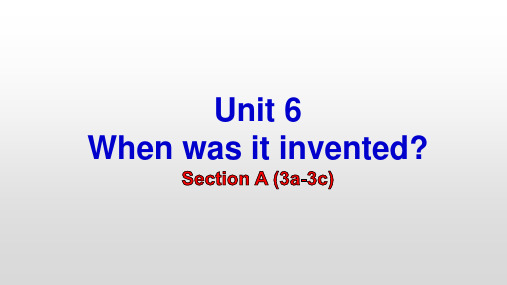
2. It is said that a Chinese ruler called Shen Nong was the first to discover tea as a drink. ruler n. 统治者;支配者 rule (v. 统治) + (e)r → ruler 统治者 e.g. 这个新兴国家需要一位现代头脑的 统治者。 Theded ruler.
4. What is Cha Jing about? _T_h_e__b_o_o_k_d__es_c_r_i_b_e_s _h_o_w__t_ea__p_l_a_n_ts__w_e_r_e__ _g_r_o_w_n__a_n_d__u_se_d__t_o_m__a_k_e_t_e_a_._I_t _a_ls_o______ _d_i_sc_u_s_s_e_s_w__h_e_re__th__e_f_in_e_s_t_t_e_a_l_e_a_v_es__w_e_r_e_ _p_r_o_d_u_c_e_d_a_n__d_w__h_a_t_k_i_n_d_s_o_f_w__a_te_r__w_e_r_e__ _u_s_e_d_. _______________________________ 5. When was tea brought to other countries? _T_e_a_w__a_s_b_r_o_u_g_h_t__to__K_o_r_e_a_a_n__d_J_a_p_a_n_____ _d_u_r_i_n_g_t_h_e__6_th__a_n_d__7_th__c_e_n_tu_r_i_e_s_. _It__w_a_s__ _b_r_o_u_g_h_t_t_o__E_n_g_l_a_n_d_a_t_a_r_o_u_n__d_1_6_6_0_._____
人教版英语九年级6-14单元复习总结讲义(无答案).doc
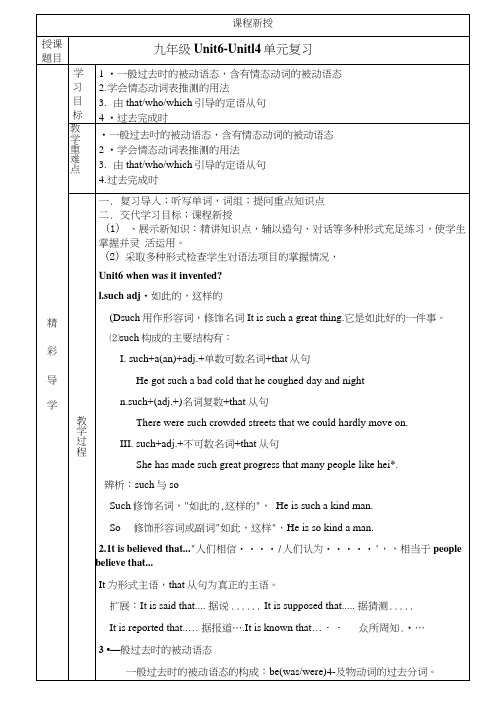
・・・・.was/were invented in +年代。
被发明于••…Who was/were .....invented by? .....是被谁发明的?What was/were ••…used for? ••…是用来做什么的?注意:⑴莫忘记还原to,在主动语态中make,see,watch等动词后接省略to的不定式作宾语补足语,变成被动语态时,不定式符号to要述原。
In the old days,they were made to work in the factory from morning toevening.⑵介词跟上去。
在主动语态屮,动词短语屮的介词在变为被动语态时,仍要跟在原动词之后。
Old people weren't taken good care of in 1980.Unit 7.Teenagers should be allowed to choose their own clothes・1・倒装句(neither在此处类似的用法)由so+助动词(be/do/will/have)/情态动词+主语意为:…也是一样She is a student. So am I.她是一个学生,我也是。
'She went to school just now. So did I.她刚才去学校了,我也是、She has finished the work. So have I .她己经完成了工作,我也完成了。
She will go to school. So will he.她将去学校,他也是。
So +主语+助动词(be/do/will/have)/情态动词…确实是.2.Keep sb.from sth.保护某人免受・・・・的影响或损坏()The sunglasses can keep our eyes from the sun.Keep sb./sth from doing sth. “阻止某人、某物做某事。
人教新目标九年级英语unit6辅导讲义设计
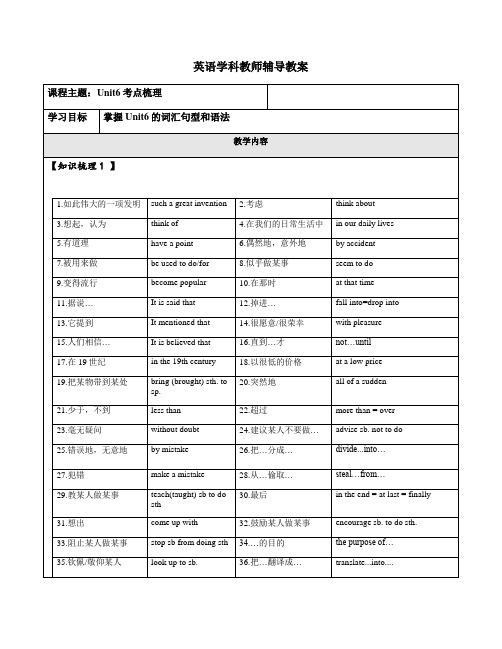
invent
发明
发明的东西是从前没有的
Who invented the steam engine?谁发明了蒸汽机?
discover
发现
发现的事物是本来存在的或是有人知道的
Columbus discovered America
哥伦布发现了美洲
take place指经过事先安排的事件发生,happen为不及物动词,意为“发生”,常用于偶然或者突发性事件。
An accident happened in that street.
The story took place last month.
14. This helped to spread thepopularityof tea and the tea plant to more places around the world. (P. 43)
2.changing thestyleof the shoes (P. 42)
style用作名词,表示“样式、款式”,in style表示“流行、时髦”,out of style表示“过时”。
I like different styles of clothes.
Long shirts are black in style.
be pleased with sth对….满意
4.Is it reallysucha great invention? (P. 42)
“such+a/an+adj.+n.”表示“如此……的……”,相当于“so+adj.+a/an+n.”。
I have never read such an interesting book.
- 1、下载文档前请自行甄别文档内容的完整性,平台不提供额外的编辑、内容补充、找答案等附加服务。
- 2、"仅部分预览"的文档,不可在线预览部分如存在完整性等问题,可反馈申请退款(可完整预览的文档不适用该条件!)。
- 3、如文档侵犯您的权益,请联系客服反馈,我们会尽快为您处理(人工客服工作时间:9:00-18:30)。
课程新授授课题目九年级Unit6-Unit14单元复习精彩导学学习目标1.一般过去时的被动语态,含有情态动词的被动语态2.学会情态动词表推测的用法3. 由that/who/which引导的定语从句4. 过去完成时教学重难点1.一般过去时的被动语态,含有情态动词的被动语态2.学会情态动词表推测的用法3. 由that/who/which引导的定语从句4. 过去完成时教学过程一、复习导入;听写单词,词组;提问重点知识点二、交代学习目标;课程新授(1)、展示新知识:精讲知识点,辅以造句、对话等多种形式充足练习,使学生掌握并灵活运用。
(2)采取多种形式检查学生对语法项目的掌握情况Unit6 When was it invented?1.such adj.如此的,这样的⑴such 用作形容词,修饰名词It is such a great thing. 它是如此好的一件事。
⑵such构成的主要结构有:such+a(an)+adj.+单数可数名词+that从句He got such a bad cold that he coughed day and nightsuch+(adj.+)名词复数+that从句There were such crowded streets that we could hardly move on.such+adj.+不可数名词+that从句She has made such great progress that many people like her.辨析:such与sosuch 修饰名词,“如此的,这样的”,He is such a kind man.so 修饰形容词或副词“如此,这样”,He is so kind a man.2.It is believed that.... “人们相信..../人们认为.....”,相当于people believethat... It 为形式主语,that从句为真正的主语。
扩展:It is said that.... 据说... It is supposed that..... 据猜测.....It is reported that ..... 据报道... It is known that..... 众所周知.....3.一般过去时的被动语态一般过去时的被动语态的构成:was/were+及物动词的过去分词When was/were .....invented? ......什么时候发明的?.....was/were invented in +年代. ......被发明于.....Who was/were .....invented by? .....是被谁发明的?What was/were ed for? .....是用来做什么的?注意:⑴莫忘记还原to,在主动语态中make,see,watch等动词后接省略to的不定式作宾语补足语,变成被动语态时,不定式符号to要还原。
In the old days, they were made to work in the factory from morning to evening.⑵介词跟上去。
在主动语态中,动词短语中的介词在变为被动语态时,仍要跟在原动词之后。
Old people weren’t taken good care of in 1980.Unit 7 Teenagers should be allowed to choose their own clothes.1.倒装句(neither在此处类似的用法)由so+助动词(be/do/will/have)/情态动词+主语意为:…也是一样She is a student. So am I.她是一个学生,我也是。
She went to school just now. So did I . 她刚才去学校了,我也是She has finished the work. So have I .她已经完成了工作,我也完成了。
She will go to school. So will he.她将去学校,他也是。
So +主语+助动词(be/do/will/have)/情态动词…确实是.2.Keep sb.from sth.保护某人免受....的影响或损坏()The sunglasses can keep our eyes from the sun.k eep sb./sth from doing sth. “阻止某人、某物做某事”(强调from不能省略)相当于stop sb./sth.from doing sth.(from可以省略)3.regret 懊悔,感到遗憾(forget to do ;forget doing;remember todo ;rember doing )regret doing sth.后悔做了某事,表示事情已经做了,但是后悔了。
regret to do sth.很遗憾地做某事,表示的是事情还没有做。
4.含有情态动词(以should为例)的被动语态1. 情态动词should 表示“应该”,用于各种人称,无人称和数的变化,常见的情态动词还有can,may,must,might等。
被动语态构成:情态动词+be+过去分词Many trees should be planted on the mountains by us.2. 结构肯定句:主语+should be +过去分词(+by+宾语)否定句:主语+should not be +过去分词(+by+宾语)一般疑问句:Should+主语+be +过去分词(+by+宾语)?特殊疑问句:特殊疑问词+should+主语+be +过去分词(+by+宾语)?When should the flowers be planted?Unit8 It must belong to Carla1. something unusual构成:不定代词+形容词(定语后置)2. There be sb/sth doing sth表示某地有某人或某物正在做某事There is a car collecting the rubbish over there .There are some people picking apples on the farm.3.就近原则以下词作主语时,后面的名词或的代词用复数,但谓语动词用单数。
either of ...中的任一(两者间)any of ...中的任一(三者或三者以上)one of ...中的一个every one of ...中的每一个each of ...中的每一none of+可数名词复数(谓语动词可用复数或单数)...中没有...(三者或三者以上)none of+不可数名词...中没有...(三者或三者以上)以下短语遵循就近原则,即谓语动词以更靠近它的主语来决定其单复数。
there be... 某地有某物either...or.. 不是...就是...,或者...或者... neither...nor... 既不...也不...,两者都不... not only...but also... 不但...而且...n ot…but…Whether……or……There is a book and some pencils on the desk. =There are some pencils and a book on the desk.4.情态动词表推测:(可能性:must> can/could> may/might)(一)情态动词表推测的三种句式 (can不肯, may 不问 must 肯定不否问) 1) 肯定句中一般用must (一定),may(可能),might (也许,或许)(1)The photo must be Lu’s, those must be their parents.(2)The policeman may know the way to that school.(3)The notebook may belong to Jim, it’s on his desk.(4)If you have any idea where it might be, please call me.2) 否定句中用can’t / couldn’t(不可能), may not/might not(可能不)(1)It can’t/couldn’t be the headmaster. He has gone to America.(2)The doctor may not/might not be in the hospital now, It’s nearly six.3) 疑问句中用Can/Could (能...?)(1)Could he have finished the task? 他可能把任务完成了吗?(2)Can he be at home now? 他现在能在家吗?注意:关于Must提问的一般疑问句,否定答案用need代替mustMust we register before using the site?-Yes, you must. / No, you needn’t.Unit 9 I like music that I can dance to.1.prefer+名词或动名词“宁愿”,“更喜欢”prefer to do “愿意做”prefer sb. to do “愿意某人做”prefer A to B. 比起B更喜欢Aprefer doing sth. to doing sth.“宁愿做...而不做...prefer to do sth. rather than do sth.“宁愿做...而不做...”=would do sth. rather than do sth.=would rather do than doprefer意为“更喜欢;更喜爱”,相当于like...better。
其现在分词应双写r 再加ing,过去式与过去分词形式应双写r再加ed。
其后可接名词、动词ing 形式或动词不定式等。
2.take off固定短语,意为“脱下(衣服)”,此时反义短语为put on。
take off还可意为“(飞机等)起飞;匆匆离去,急忙离开;休假;休息”。
3.辨析:except,besides,but,except forexcept是介词,意为“除了(某人/某事)之外”,表示所说的不包括在内。
besides是介词,意思是“除(某人/某事)之外(还有)”,表示所说的包括在内;but也表示“除了”,相当于except,往往放在all,none,every,any,no以及everything,everybody,nothing,anywhere等词之后。
